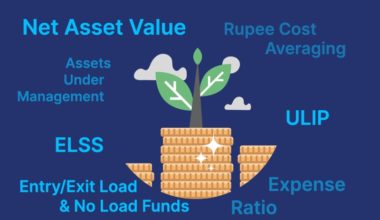Equity funds, indicative by the name itself, is a mutual fund that majorly invests in stocks and equities. Many investors want to benefit from the stock market but are skeptical about it due to a multitude of reasons. They either lack the expertise to choose the right stocks or predict the market trends. They may also not have the time to keep an eye on the share market and the stock performances on a daily basis. Through mutual funds, investors can grab the opportunity to invest in shares and enjoy the benefit of professional management. The best part is that mutual funds invest in multiple company stocks across various sectors and capitalizations. Therefore, you can hold part ownership in the profit of various companies.
Although different mutual funds have different ratios of asset allocation, it is equity mutual funds that primarily invest in shares/equities. It invests a little percentage of the fund corpus in other asset classes. High investment in shares makes it a high risk-return investment.
What are Equity Funds – Definition & Characteristics
As per the Securities and Exchange Board of India (SEBI), schemes that allocate about 65% or more of the fund money qualify for equity funds. Therefore, equity funds are those that predominantly invest in stocks of the market-listed companies.
When several investors build a pool of corpus, the fund managers invest them wisely in equities to generate maximum returns while keeping a check on the risk. Nevertheless, equity funds are the riskiest among all types of mutual funds but also provide the highest returns on investment. Through equity funds, fund managers essentially buy the ownership of various publicly traded businesses for investors. It makes them a shareholder in their profits and losses.
Characteristics
Some of the basic characteristics of equity funds are:
- As the name suggests, equity mutual funds invest a major portion of the fund corpus in equities. They invest in stocks of companies of all sizes and its main objective is capital appreciation
- Investors who aspire for wealth generation can go for equity funds. These funds usually offer better returns than hybrid or debt funds as well as bank deposits
- Those who have a high-risk tolerance while aiming for high returns can invest in these funds. If you want safe returns on invested amount even with lower interest, then this fund is not for you
- Equity funds are well-suited for long-term investment like for 5 years or more. Stock prices fluctuate and rise gradually over a span of a few years. This is why equity funds take time to give high returns
- Equity funds can give you a diverse portfolio of stock investment as they usually invest in about 40-50 stocks. So, if you wish to join the rally of equity markets to earn high gains, invest in equity mutual funds to buy collective shares
- You can invest both through lump sum or via Systematic Investment Plans (SIPs)
Types of Equity Funds
There are various schemes of equity funds that can be clubbed into different categories. This categorization can be done on multiple bases like capitalization, investment strategy, diversification, and management style. Let’s discuss the types of equity funds in detail:
Types of Equity Funds based on Capitalization
Market capitalization means the total worth of a company which is the total market value of its outstanding shares. SEBI lists companies as per their capital structure as large, medium, or small. The first 100 companies are large-sized companies or blue-chip companies, the next 150 are mid-sized and the rest are small ones. So, various types of equity funds based on capitalization are explained below-
1. Large-Cap Funds
Equity mutual funds that invest largely in large-sized companies or blue-chip stocks are Large Cap Funds. Alternatively, they are also known as Bluechip Funds. These are safer options among the equity funds as blue-chip stocks have good value and reputation in the market.
2. Mid-Cap Funds
Equity funds that invest in stocks of medium-sized companies by far and large are mid-cap funds. They may offer better returns than large-cap funds in the long run if they perform well but are also highly volatile.
3. Small-Cap Funds
When mutual funds invest around 65% of assets in small-capitalization stocks, it is small-cap funds. They are riskier than both large-cap and mid-cap funds but still, most companies fall in this category.
4. Multi-Cap Funds
When equity funds diversify and invest in companies panning across all capitalizations, it is multi-cap funds. It invests in stocks of companies of multiple capitalization sizes in varying proportions. However, they must allocate a minimum of 25% of assets in each cap.
5. Flexi-Cap Funds
This is a recently launched fund and people often confuse Flexi-cap and multi-cap funds. Although both funds have one thing in common they invest in stocks of all capital sizes, there is a difference in the ratio of asset allocation. As mentioned above, multi-cap funds have to invest at least 25% of the corpus in large, medium, and small caps. In Flexi-cap funds, as it is suggestive, the asset allocation to each market cap is flexible without any restrictions. In Flexi-cap funds, fund managers invest about 65% of the corpus in equity. Flexi-cap has no mandate as such of multi-cap and has the freedom to invest in each cap in any proportion.
6. Large Mid-Cap Funds
These funds aim to create a blend of large-cap and medium-cap stocks in an investment portfolio in almost equal proportions. They can offer better returns at lesser risk. 35% asset allocation to large-cap stocks makes it less volatile. Whereas, 35% of assets allocated to mid-cap stocks can generate high returns in the long term.
Investment Strategy based Categorization
Fund managers follow different tricks and strategies to pick the stocks to garner the optimum returns. They either follow the top-down strategy or the bottom-up strategy. In the former, fund managers first select the top-performing sectors for a type of equity fund and then select the best stocks within that sector. In bottoms up, they select the well-researched stocks that are either performing well or show potential. They give preference to the right stocks irrespective of the sector the company belongs to.
Other than these two strategies of stock picking, equity funds can be classified into the following types as per the investment methodology of fund managers:
1. Growth Funds
Some company stocks may show consistent growth by performing well in the market or even outperforming the benchmarks. They have a proven track record of profitability and look promising to continue to do so in the future. When fund managers choose such equities that have been growing and are likely to sustain, they are called growth funds.
2. Value Funds
When fund managers pick up those stocks that may not be performing well as of now but have great potential, such equity funds are value funds. They are named Value Funds as the stocks in which the fund money is invested are yet to realize their true value. They will gradually grow and come to their real and right market price.
3. Contra Funds
As the name suggests, fund managers take a ‘contrarian’ approach to the investment as they pick up not the growing stocks but underperforming ones. They invest in such shares to buy them at low prices and expect that they will perform well in the future giving manifold returns. They go contrary to the market sentiment.
People often confuse contra funds with value funds as both appear similar but are not. Value funds are undervalued stocks that may have strong intrinsic value and great potential to grow exponentially. They may be trading at a lower value due to market instabilities or similar reasons. On the other hand, Contra Funds are underperforming stocks and the cause can be the underperformance of a sector or other political and economic reasons.
Categorization on the basis of Diversification
1. Sectoral Funds
Sectoral funds are those equity funds that invest in a particular sector/industry like information technology, banking, real estate, FMCG, etc. For instance, in the last couple of years, pharmaceutical companies’ stocks have witnessed an uprise due to the COVID-19 pandemic. So, if a fund scheme plans to focus majorly on the pharma sector by primarily investing in stocks of pharma companies, it is a kind of sectoral fund.
2. Thematic Funds
Thematic Funds, as one can guess, are funds that invest around a theme. Investors confuse between the thematic funds and the sectoral funds. But, it is important to note that the latter invests only in a particular sector. Whereas, the thematic funds can invest in multiple sectors that are well-defined to a theme. For example, if fund managers want to invest around farming or agriculture themes, they may invest in various company stocks of different sectors like fertilizers, automobiles, Agri products, and so on.
3. Focussed Funds
Focussed funds are those equity funds that focus on a few stocks. Often confused with sectoral and thematic funds, focussed funds neither invest in a particular sector nor stocks explicit to a theme. However, they concentrate on a very limited number of stocks in limited sectors rather than a large variety of stocks.
All three types of funds, sectoral, thematic, and focussed funds are less diverse than other equity funds. Among the three, thematic funds have the most diversification as they invest in a mix of sectors and stocks.
Categorization as per Management Style
Funds can be actively or passively managed to handle volatility and make the best out of equity funds. Fund managers can either follow the market indices to invest in similar stocks or research themselves and make tactical calls. Based on their management style, they are of two types:
1. Active Equity Funds
Asset Management Companies (AMCs) have a team of experts that continuously track the performance of various equities in the share market. They check the bear and bull market trends, the stocks that are rising or have the potential to, and what could be a risky investment. When fund managers, backed by their teams, actively analyze, invest and manage the shares, it is an active equity fund.
2. Passive Funds
Passive funds are those funds where the fund managers are passively managing the fund by simply following the market indices. They do not engage in detailed research and analysis but invest in benchmark stocks. Index Funds and Exchange Traded Funds are examples of passive funds. Like a Nifty Index Fund will invest in all Nifty stocks in the same proportion as they form a part of Nifty.
Wrapping it up:
Equity funds are mutual funds with a high risk-return ratio that can withstand market volatility in the long run. Hence, they are good for a long-term investment that can give 10-12% returns but this may vary according to the market conditions. Investors should choose the right fund to suit their financial goals, investment horizon, and risk tolerance. If they can take a bit of risk to participate in equity markets and create a corpus in a span of 5-10 years, then invest in equity funds.










